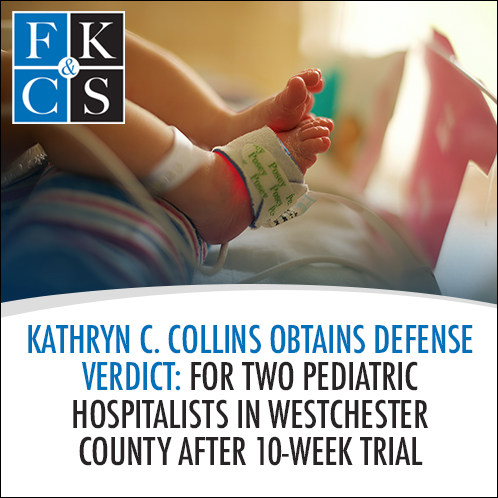 Kathryn C. Collins successfully defended two pediatric hospitalists who, in 2015, were working at Orange Regional Medical Center (ORMC) in Middletown, New York.
Kathryn C. Collins successfully defended two pediatric hospitalists who, in 2015, were working at Orange Regional Medical Center (ORMC) in Middletown, New York.
The case involved claimed brain damage of a then 9-week-old premature infant due to the development of severe acute hyponatremia. In this very complex case, Feldman, Kleidman, Collins & Sappe LLP’s (FKC&S) two clients cared for the infant plaintiff after she presented to the emergency room (ER) in the late afternoon with a history of congestion, vomiting, decreased drinking of her bottles and decreased wet diapers. The infant was diagnosed in the ER with dehydration and a respiratory syncytial virus (RSV) infection. The lab work performed in the ER indicated mild dehydration and normal sodium. The infant was provided two saline boluses to counteract the dehydration and Collins’s clients admitted her to the pediatric floor. They started her on maintenance IV fluids to ensure that while the infant was still not drinking or having wet diapers, she remained hydrated.
During the overnight shift, the infant finally started having wet diapers and began to slowly drink small amounts of her bottle, but her primary nutrition came from her maintenance fluids. The following day, she began to drink more of her bottle and was clinically improving. The plan was to continue the maintenance fluids and to repeat the labs performed in the ER the following morning. Just before midnight (30 hours after admission), the infant began to have subtle seizure activity which was acted on immediately and the infant was transferred to Westchester Medical Center (WMC). Prior to the transfer, repeat lab work was performed which revealed a low sodium, and at the direction of the pediatric intensivist at WMC, the infant was given a sodium rich fluid to counteract the hyponatremia that had developed. The infant remained at WMC for six days, returned to what appeared to be baseline and no additional seizure activity occurred.
As the infant matured, she was diagnosed with a seizure disorder and developmental and cognitive delays. In addition, she was diagnosed with attention-deficit/hyperactivity disorder (ADHD).
The plaintiff claimed that the seizure disorder, ADHD and the developmental and cognitive delays were all attributable to a brain injury caused by ORMC’s ER physician’s failure to properly monitor the infant’s sodium after administering saline boluses; Collins’s clients’ failure to timely monitor the infant’s sodium during the 30 hours prior to the onset of seizure activity; ORMC’s pediatric nurse’s failure to timely report a decrease in wet diapers; as well as by WMC’s providers in the pediatric intensive care units (PICU) failure to properly monitor the infant’s sodium while correcting her hyponatremia.
The plaintiff’s pediatric critical care expert claimed that 25 percent of children who are hospitalized with RSV develop hyponatremia and five percent develop a condition called syndrome of inappropriate anti-diuretic hormone (SIADH) which causes a dysregulation in the pituitary gland resulting in an over production of antidiuretic hormone causing fluid retention disrupting the sodium balance in the body. This expert opined at trial that this infant developed severe hyponatremia due to SIADH and because, in his opinion, hyponatremia happens so frequently with RSV, the ORMC providers should have retested the sodium within 12 hours of administering her fluids as that was what the standard of care required. He testified that had the sodium been retested during that time frame, it likely would have been lower than it was on admission, although he could not identify how much lower or whether it would have been abnormally lower. He opined that, had it been retested and found to be some unidentified lower number, that it would have altered the fluid administration to this infant and it may have prevented the development of hyponatremia. He also opined that the providers at WMC ‘overcorrected’ the infant’s hyponatremia leading to a condition called osmotic demyelination syndrome (ODS), wherein the destruction of the sheath covering nerve cells primarily in the brainstem occurs leading to brain cell dysfunction.
The expert conceded on cross examination that, although he runs one of the largest PICU’s in the country, that he has not seen SIADH in an infant due to RSV and that it is very rare. He also stated that there are years that even he doesn’t see hyponatremia from RSV despite RSV being the number one cause of hospitalizations in infants and even though he told the jury that it occurs in 25% of RSV patients. He further conceded that he had never seen ODS in an infant as young as the plaintiff.
The plaintiff’s pediatric neurology expert testified that all of the infant’s current complaints were directly related to the events at ORMC and WMC and that the infant would never be employable or be able to live independently. He also testified that ODS was the cause of all of the infant’s current issues. On cross examination this expert conceded that he had to look up ODS because he has not seen it before in an infant this young. On cross examination, he further conceded that when he examined the infant and drafted his examination reports, he was not aware of the family history of ADHD, childhood seizures or learning disabilities, all of which would have been relevant to him. He also testified that he ruled out a genetic cause for the infant’s issues because he had reviewed a genetic test that had been performed a year prior to trial and, in his mind, that test ruled out a genetic component even though it identified a variant of unknown significance on the SCN1A gene, a gene commonly associated with seizure disorders also involving developmental and cognitive delays, as well as ADHD.
The plaintiff’s neuroradiology expert opined that a computed tomography (CT) scan that had been performed at WMC upon the infant’s arrival showed severe cerebral edema and that an MRI performed six days later evidenced extra-pontine myelinolysis, a rare presentation of ODS. This expert conceded that he could not recall a time when he had seen ODS in an infant as young as the plaintiff.
Given that the genetic report was not received by the defendants until two months before trial, none of the defendants had been able to retain a genetics expert. The court ruled that without a genetics expert, the genetics report itself would not come in at trial, however the court would entertain offers of proof from the defense pediatric neurology experts on the issue.
FKC&S’s clients, their neuroradiology expert, pediatric neurology expert and pediatric endocrinology expert explained that first, RSV and hyponatremia do not go hand in hand, nor does SIADH and RSV. While there have been cases of hyponatremia in infants with RSV, those cases involve infants with severe RSV whose lung function is poor. The plaintiff’s lung function was never abnormal. Furthermore, the defense pediatric endocrinologist who works at a large children’s hospital in a metropolitan area, testified that she has never seen RSV with resulting hyponatremia, nor has she seen RSV with resulting SIADH and as a pediatric endocrinologist she consults on every hyponatremia and/or SIADH case that comes to the hospital she works at. Additionally, she testified that there was no clinical basis for Collins’s clients, nor any of the ORMC providers, to believe that this plaintiff was at risk for developing hyponatremia.
The neuroradiology expert explained that there was no cerebral edema present on the CT scan, and he showed the jury angles of the CT images which clearly showed a lack of swelling in the brain. He opined that based upon the lack of edema in the brain, this hyponatremic event was not injurious to the infant, nor was the seizure activity. He further testified that the abnormal findings on the MRI six days after the seizure were not ODS, but rather findings related to the RSV infection itself and he came to this opinion based upon the two subsequent MRI’s which evidenced a complete resolution of the abnormalities on the initial MRI. Per the neuroradiology expert, ODS does not ’resolve’ or go away and it is unheard of in infants as young as the plaintiff because the nerve sheaths are not developed at her age. Therefore it would be impossible to develop ODS and as such there was never any ODS and there was no injury.
The pediatric neurology expert opined that even before seeing the genetics report he believed that the infant’s current issues were genetic in nature given the pattern with which they presented. The involvement of a mutation of the SCN1A gene further supported his opinion. Due to a ruling of the court he was not permitted to testify to this at trial, but he was of the opinion that because the mutated gene was a sodium channel gene, the genetic abnormality was the reason that the infant developed hyponatremia as well.
The plaintiff’s counsel requested over $30 million in damages for past and future pain and suffering, future medical costs and future lost earnings.
After roughly a ten-week trial and two days of deliberations, the jury returned a verdict in favor of FKC&S’s clients, finding that both of the pediatric hospitalists had rendered proper care to the infant. The jury additionally found that the providers at WMC also provided appropriate care to the infant. Prior to the verdict, the court found that the plaintiff failed to prove a case against the ORMC ER physician and the ORMC pediatric nurse, so both were dismissed from the matter.
This success was not Collins’s alone. Renee Harbolic, Terry Horner and Katherine Crimi all assisted Collins in her preparation for trying this matter and played an integral part in the ultimate success of this defense.

